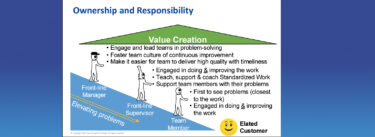The global consulting firm McKinsey & Company recently published an article titled “Reshaping IT management for turbulent times,” where they explore the implications of lean management techniques applied to IT services. In a survey of 864 executives, McKinsey reports 64% are currently deploying Lean IT (Lean techniques applied to information and information systems) in some manner.
Is this a realistic figure? Perhaps, when you consider the wide-spread adoption of Agile Software Development during the past decade. And beyond Agile, there are other aspects of IT services (such as infrastructure and support services) that are now discovering the benefits of Lean discipline as well.
But when we read the study, we asked ourselves, “Does the 64% figure simply reflect the implementation of Agile, ITIL’s (Information Technology Infrastructure Library) Service Management Framework, and other IT methodologies that have been influenced by Lean? Or do these results indicate an authentic transformation of Lean thinking and management behavior, where the business and IT actively collaborate to deliver value to customers across all enterprise value streams? We suspect mostly the former. Our experience suggests that most IT organizations are just beginning to realize and internalize the fundamental Lean principles, supported by the familiar systems and tools.
In this article, McKinsey distinguishes two categories of Lean IT:
- “Enabling IT” embeds flexible IT workgroups directly into the business to support experimentation, collaboration, and data mining in order to propel innovation and competitive advantage
- “Factory IT” couples lean management techniques and process improvements with advances in cloud computing and software development to simplify the operating environment and improve productivity and cost performance
This is a direct parallel to the structure we present in our book Lean IT where we explore “Outward facing” IT services to enable the business and its customers, supported by “Inward facing” IT operational excellence – including Lean Software Development, Lean Service Management, and Lean Project Management.
We are particularly interested in McKinsey’s use of the term “Factory IT”, and in response we submit three (hopefully) thought-provoking questions for reflection:
- Will the term “Factory IT” resonate with IT professionals?
In the Lean IT workshop we are careful to emphasize IT stories, examples and exercises. In our experience, presenting a manufacturing oriented Value-Stream Mapping exercise to an IT crowd floats like a lead balloon. While Lean principles remain constant, we find the application of the techniques must be framed in an appropriate context for IT professionals to understand, accept and internalize them. - Why use the word “Factory” as a metaphor for IT operational excellence?
Perhaps it’s because IT has the historical reputation of being costly, risky, and unmanageable, and so by presenting IT in a manufacturing context, we hope that it will become more reliable and cost effective? Without a deliberate transformation effort, however, a superficial approach to Lean will fall short and may even be counterproductive. - What kind of Factory do we want IT to become?
Do we want a traditional mass production operation that focuses on low cost, repetitive delivery? Or do we want a Lean, mass customization operation that delivers fast, high quality, scalable, configurable services to their customers on demand? The latter is a value delivery proposition, rather than the former which is a traditional cost reduction proposition.
If we’re not careful, C-level executives may grab the term “Factory IT” and run with it towards cloud computing and outsourcing, with the primary goal of cost reduction. While a singular focus on cost reduction is a common trap for all applications of Lean, it is especially perilous for IT. Why? Our opinion is that IT is often misunderstood, and perhaps even feared, by many executives. When confronted with difficulties (complexity, inflexibility, failed projects, cost overruns, etc.) the instinctive reaction is to cut costs and/or outsource.
While cost reduction is a natural by-product of Lean, it should not be the primary goal. Lean encourages a relentless focus on value creation, quality and speed, through rapid, iterative cycles of learning (PDCA). When an organization assimilates Lean Thinking into their daily behavior and culture, they naturally become more responsive and competitive – delivering more value for a lower total cost.
As we conclude in while the cloud may change the cost structure of IT services, competitive advantage will still go to those who are able to use IT effectively to support the business. And the key to this? IT process leadership, supporting the continuous improvement and innovation of business processes – Lean IT.





